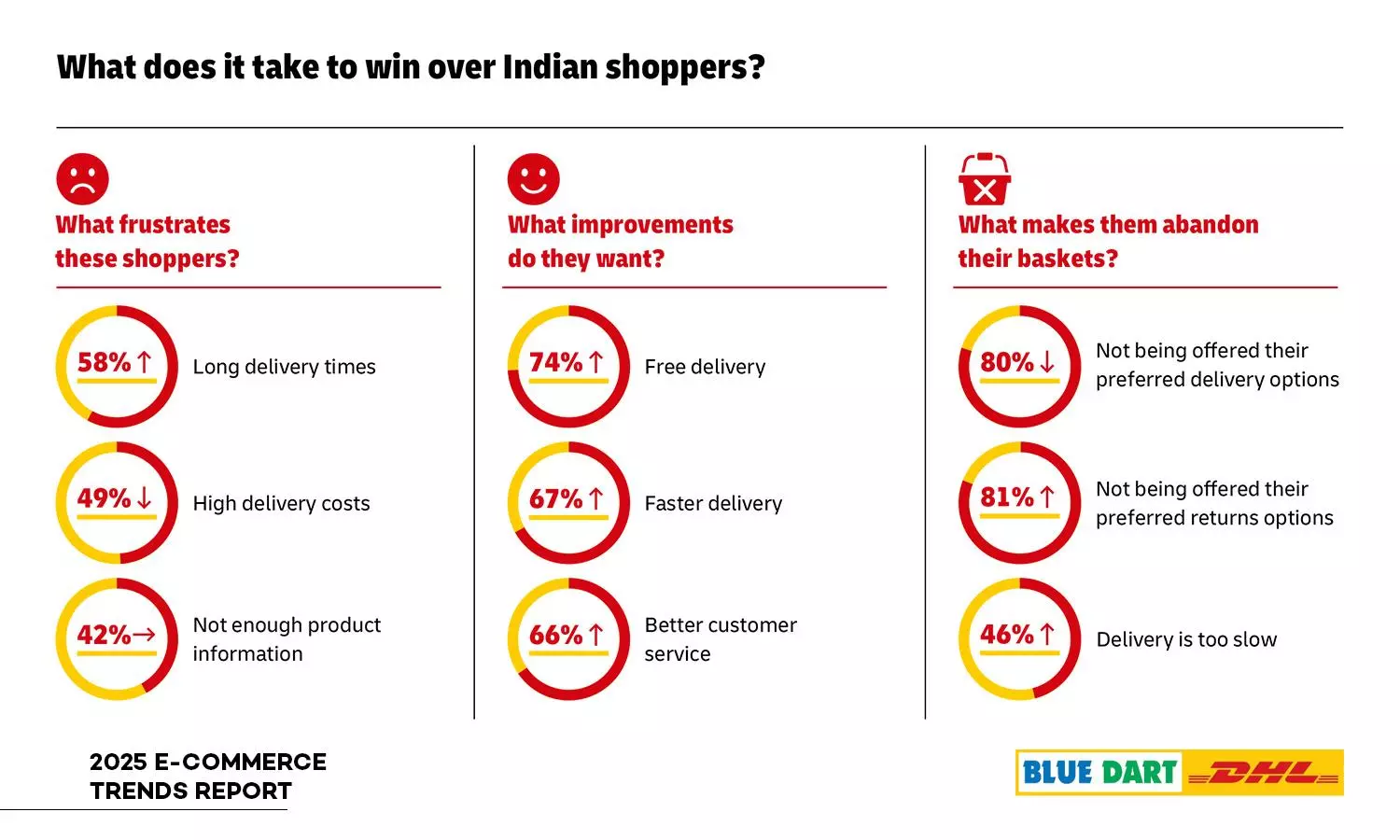Why delivery and returns now define Indian e-commerce?
A recent DHL eCommerce and Blue Dart study found that delivery failures are killing e-commerce conversions.

In a digital marketplace overflowing with choice, it’s not price or product variety that’s leading Indian consumers to abandon their shopping carts—it’s logistics. According to the newly released E-Commerce Trends Report 2025 by Blue Dart and DHL eCommerce, 80% of Indian shoppers abandon their carts if their preferred delivery option isn’t available. The issue is magnified on the returns side, where 81% say they would drop out of a transaction if the return process doesn’t match their expectations.
This is no small-scale trend—it’s a national signal that logistics has moved to the very core of customer experience. Despite slick user interfaces, aggressive discounts, and even AI-powered shopping tools, e-commerce brands are losing out where it matters most: the final mile.
Trust in delivery providers now drives purchase decisions
As consumers become more informed and less forgiving, logistics providers are becoming the face of the brand experience. The report found that 54% of Indian shoppers will not buy from a retailer if they do not trust its delivery and returns provider. In an age of hyper-personalisation and instant gratification, reliability and transparency in logistics are non-negotiable.
“Despite significant advancements in digital shopping, it’s the fundamentals of delivery and returns that continue to define the customer journey,” said Balfour Manuel, Managing Director of Blue Dart. “Convenience, choice, and control are non-negotiable as many Indian consumers abandon their purchase if their preferred delivery option isn’t available.”
The implication for brands is clear: no matter how good the online interface or pricing strategy, it is the backend logistics system—delivery options, transparency, speed, and return management—that can either build long-term loyalty or instantly repel a customer.
Returns are the new battleground
While much of the industry’s innovation has focused on streamlining the front-end user experience, Indian shoppers are making it clear that the post-purchase phase matters just as much. With more than four in five shoppers ready to cancel a transaction if the return process is cumbersome or unclear, reverse logistics is no longer a side process—it’s a front-facing, conversion-critical pillar of e-commerce.
Return expectations are now informed by broader digital habits: shoppers expect instant initiation, status updates, free return pickups, and short refund cycles. Brands that cannot offer this seamless reverse flow are not just at risk of losing one order—they risk losing the customer altogether.
The rise of social commerce adds pressure to logistics
Shopping behaviour in India is evolving just as rapidly as expectations around delivery. According to the report, 84% of Indian consumers have already made purchases via social media, and 90% expect social platforms to be their primary shopping destination by 2030. The popularity of apps like Instagram, Facebook, and YouTube is reshaping how, when, and where consumers transact.
This shift also introduces new complexities for logistics providers. As social commerce platforms continue to blur the lines between inspiration and transaction, the need for real-time, mobile-first fulfilment becomes paramount. Traditional supply chain models—designed for desktop-first e-commerce—are already under strain. Fast fulfilment, real-time inventory visibility, app-integrated logistics tracking, and flexible last-mile solutions are now essentials, not extras.
Voice commerce is also making inroads, with 64% of Indian shoppers already using voice assistants to make purchases. This growing preference for hands-free, on-the-go shopping further heightens the demand for dependable delivery ecosystems that can meet spontaneous demand without sacrificing reliability.
Sustainability is a logistics challenge—and an opportunity
Beyond speed and flexibility, Indian consumers are holding brands accountable for the environmental impact of their purchases. The report found that 82% consider sustainability when shopping online, while 59% have actively abandoned carts due to sustainability concerns.
This changing behaviour puts pressure on logistics systems to evolve from merely fast to consciously efficient. Packaging materials, transport emissions, and reverse logistics operations are all now being scrutinised by environmentally aware customers. In fact, 52% of shoppers prefer refurbished or pre-owned items, and 81% are willing to participate in recycling or buy-back programs if offered by retailers.
Retailers that build sustainability into their delivery and return infrastructure—from using EV fleets and sustainable packaging to enabling easier product recirculation—are not only meeting new expectations but also creating powerful brand differentiation.
Logistics is now the frontline of customer experience
The message from Indian consumers is unambiguous: no matter how sophisticated digital commerce becomes, logistics remains the real make-or-break point. Delivery, returns, trust, and sustainability have become core dimensions of e-commerce brand perception.
“As we look ahead, businesses must embrace a future shaped by innovation, transparency, and purpose-led strategies where technology not only enables convenience but also champions sustainability, accessibility, and deeper consumer engagement,” added Manuel.
For Indian e-commerce players, the path forward lies in treating logistics not as an operational cost, but as a strategic lever. Brands that successfully align their logistics networks with evolving consumer demands—across speed, trust, flexibility, and environmental impact—will unlock deeper loyalty and greater share of wallet.
In a market as competitive and fast-moving as India’s, the ability to deliver—literally—has never been more important.

Rajarshi Chatterjee
Rajarshi is an editorial professional with nearly a decade of experience in writing content for print and online publications. He has hosted numerous entrepreneurship events and moderated sessions at various events, including Flower Logistics Africa. He has previously worked with reputable organizations such as YourStory, YouGov, Inc42, and Sportskeeda and has catered to a diverse range of clients, including Google, PhonePe, the Karnataka State Government, and the Rajasthan State Government. In addition to writing, he enjoys watching films, cooking, and exploring offbeat locations in India.


